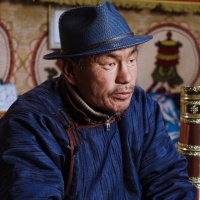Making education more inclusive in Mongolia: Meet Oyunjargal

Story highlights
- Due to a hearing impairment, 17-year-old Oyunjargal, like many other Mongolian students with disabilities, had not gone to regular school until recently.
- GPE has supported Mongolian civil society to advocate for more inclusive education, including promoting awareness campaigns on the rights of children.
- In 2019, new inclusive education measures helped ensure children with disabilities exercised their right to education. By 2021, over 80% were enrolled in schools.

This story was written in collaboration with All4Education and Oxfam Denmark.
In the early days of spring, remnants of snow cover the ground of Arbulag, a rural village in northern Mongolia where 17-year-old Oyunjargal lives with her family. She watches her father herd cattle and later helps prepare dinner, enjoying time at home before the start of another school week.
Due to her hearing impairment, Oyunjargal, like many other Mongolian students with disabilities, faced great barriers to attending regular school – until recently. It is only since 2019 that the right for children with disabilities to attend regular schools has been fully reflected in policy.
Previously, these children were referred to 1 of 6 special schools located in the capital city, too far from Oyunjargal’s home in Arbulag. With special schools out of reach for many children with disabilities, and because regular schools were not obligated to accept them, an association of parents with children with disabilities set up informal child development centers.
Oyunjargal studied at one of these centers and remained outside of the formal education system until 2021, when, at age 15, she enrolled in grade 9 at Ireedui 21st school in the nearest town of Murun, located 80 kilometers from Arbulag. As the school is far from home, she lives with her sister closer to the school and visits the rest of her family on weekends.
Making education more inclusive
Inclusive education means all children learning together in their local schools, free of discrimination, rather than in segregated environments. It means providing support in regular schools for each child’s needs, so that they are not just present but can participate fully and learn.

Before 2015, official figures showed 97% of children enrolled in schools in Mongolia, yet enrollment of children with disabilities was low. For years, this group of children had neither been considered nor counted by the public education system.
UNICEF estimated that in 2010 only 44% of children with disabilities were attending school.
Since 2019, support for Mongolia’s national civil society coalition All4Education has bolstered advocacy efforts within the country toward fulfillment of the right to quality education for all children, including those with disabilities.
The advocacy efforts of civil society to introduce inclusive education in Mongolia have led to policy changes, increased funding and greater social awareness.
In 2019, the Minister of Education and Science adopted the "Regulation on inclusion of children with disabilities in regular schools."
The new inclusive education measures for students with disabilities include a zero-rejection policy (meaning no child can be denied education because of their disability), early identification and intervention, infrastructure improvements, appropriate teaching methodologies, guidelines for school principals, and salary incentives and support for teachers who have students with disabilities in their classroom.
In addition to helping gather data for decision makers to acknowledge the challenges facing marginalized students, All4Education participates in ministry-level discussions on inclusive education as well as a parliament working group on education law.
They also monitor education policies and budget, continuing to advocate for adjustments to successfully implement Mongolia’s inclusive education policy.


Overcoming barriers to inclusive education
While the government has made great efforts to ensure that children with disabilities can both access and thrive in school, many still face barriers to a quality education, especially in rural areas.
The country needs more teachers trained in approaches for teaching children who have special needs as well as comprehensive support services for students with disabilities and their families.
Oyunjargal’s family realized she was deaf when she was 3 years old. No one in her family has sign language skills, so she has spent her life communicating with them through body movements.
With no special schools and without the option to attend regular school, Oyunjargal studied at home and attended an informal child development center established by an association of parents with children with disabilities.
When new regulations in 2019 made it possible for Oyunjargal to attend regular school, her parents needed to learn about this new opportunity.

All4Education played a big part in persuading Oyunjargal’s parents to send her to school full time. At the start of the enrollment process, her parents took part in several sessions to educate themselves about sending their child to school.
Her father is grateful to all those who have made it possible for Oyunjargal to get the education she deserves.

As part of the All4Education network, parents along with other activists have advocated for children with disabilities to be accepted and included in Mongolian society, particularly in the education system.
Supporting the expansion of inclusive education
Since joining GPE in 2006, Mongolia has received nearly US$45 million in grants. The current $5 million grant – implemented by Save the Children Australia – supports the Enabling Equity to Advance Learning project, which aims to increase all children’s access to primary and secondary education and promotes inclusive education services.
Oyunjargal is one of many students reaping the benefits of Mongolia’s increasingly inclusive education system.
With the majority of children with disabilities enrolled in regular schools, and more resources devoted to meeting the diverse needs of these students, Mongolia is on course to achieve its vision of an inclusive education system.


